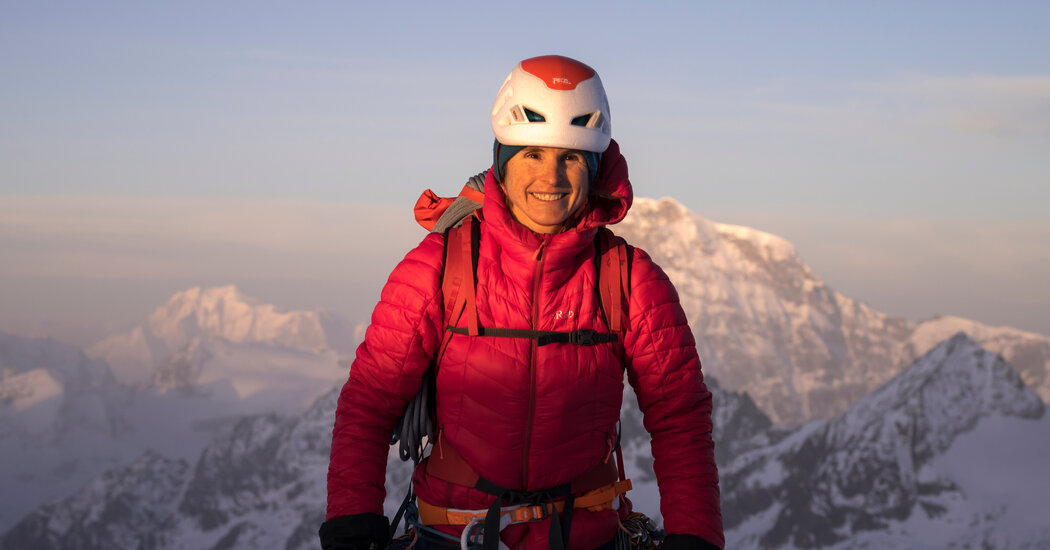
So how did you and Ms. Gerardi team up?
It was February or March 2019, and we both did a 1,000-meter vertical ski race. Hillary won, and I came in second. We were waiting for the awards ceremony after the race and my partner, Ben, heard her talking about how she wanted to set a record on the Chamonix-Zermatt route. Ben knew that I had this idea but that I doubted my abilities, so he told me: “That’s exactly the person you need to make a great team.” Hillary is about 10 years younger than me, and I think that age difference means she doesn’t doubt her abilities the way I do. Now, I see women half my age who really believe that women can make a mark and set their own records. There’s a cultural difference too — Americans have a very positive character, always saying, “That’s amazing! Good job!” While we French are more like: “OK, you could have done that better.” Hillary is a trail runner, so she has great endurance. She’s also very versatile in the mountains, very positive and very determined. Once I get into it, I’m determined, too, but I hesitate to start. So I don’t know if I would have ever set this record if I hadn’t met her.
You set the women’s record on the route in April 2021. How did the day go?
We left from the church in Chamonix at 2 p.m. and we arrived at the church in Zermatt at 4:21 p.m. the next day, which was Easter Sunday. There wasn’t a big crowd waiting, just a few family and friends. The snow conditions had deteriorated a bit over the previous week, so we were a little doubtful that we would make it, which is why we hadn’t alerted too many people. When we arrived in Zermatt, no one was really interested in these two exhausted women who were crying their eyes out and throwing themselves into the arms of the few people who were waiting.
And what did it feel like to make it to Zermatt?
It was kind of a volcano of emotions. I was exhausted and so relieved to have finished. I was also very moved because I realized that I had done it: I had made the tribute to my husband. I had done as he had done. I had succeeded in connecting Chamonix to Zermatt on my skis and without assistance. So there was a personal pride, and also powerful thoughts of Laurent. Just after his death, I had the impression that he was with me everywhere, that he was watching over me. It’s thanks to him that I’m doing this sport.
You live in Chamonix now, but you didn’t grow up in the Alps. What drew you to that part of France?
Until the age of 17, I lived in the area around Paris, but as a child I always wanted to live in the mountains. When I was 10, I had a cousin who got married in Chamonix, and while we were there, my father and I took the lift up to the Aiguille du Midi, and I was just amazed and thought, “I would love to live here.” Later, when I was a medical student in Bordeaux, I made a lot of trips to the Pyrenees, and then I did an internship in Chamonix in 2001 and 2002, when I met Laurent. Later, I was able to do some mountain diplomas, which allowed me to get a position accompanying the mountaineers of the military high mountain group. Living in the mountains has always been something inside me, and the training I’ve had has allowed me to come here and stay.
You just finished your active service with the military. Will you still work as a doctor, or turn your attention more fully to the mountains?
I’m going to try to do both — continue to work as a doctor, doing shifts in the emergency department and as a reservist for the military, while also pursuing projects in the mountains. It’s important to me to have both these lines of work, which challenge me in different ways. Being in the mountains requires a lot of intellectual ability — calculating risk, preparing your body, all of that. But, of course, being a doctor is also very intellectual. You have to really consider a diagnosis, make your investigation. It’s also fatiguing in its own way. But for me, both of these activities are really important.
Have you heard of any other women who are trying to break your record on the Haute Route?
So far, I haven’t heard anyone say that they were interested, but we would be so happy if other women came to us. Because it’s not just about keeping the record to ourselves for as long as possible. It’s about inspiring others and helping them achieve it — that’s what I didn’t have.




